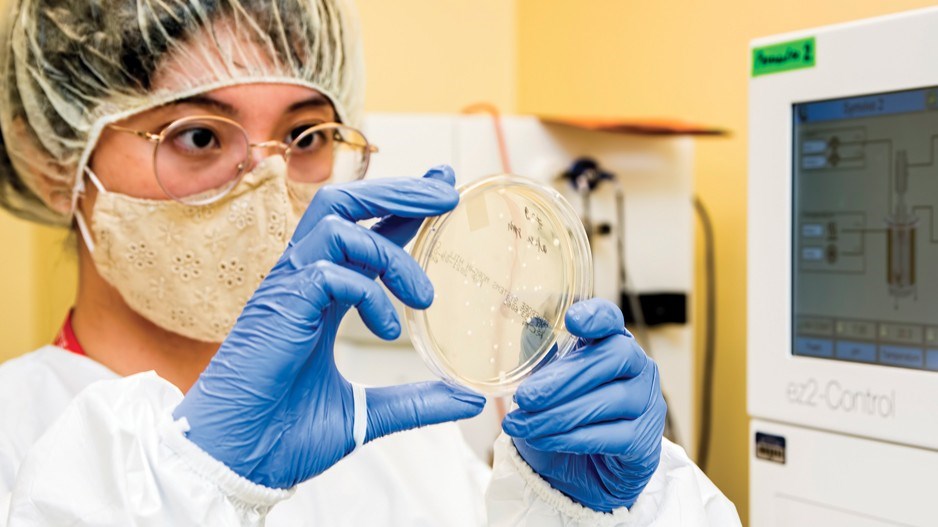Canadians have spent months queueing up for COVID-19 vaccine jabs – a nerve-wracking experience for many – from health-care workers seconded to large clinics.
Alexander Graves likes to envision an alternative mass vaccination campaign, one in which room-temperature-stable pills could be mailed directly to vaccine recipients’ homes where they’re swallowed up as easily as ibuprofen.
“You can imagine that the compliance associated with taking [it, and] for the ease of use of taking that vaccine would be much higher, as opposed to having to deal with needles,” said the founder and CEO of Symvivo Corp.
While most Canadians are familiar with vaccines administered through needles that often require chilled temperatures to remain stable, the Burnaby-based biotech is pursuing the use of live bacteria as a gene delivery platform.
Every person has Bifidobacterium – a probiotic, or “good” bacteria – in their large intestines that first enters bodies when infants consume milk and is maintained through diet or supplements.
“Now what we’ve done is take this bacteria and modify it so we can deliver genetic material to the human body,” said Graves, referring to how bacteria in the human body can produce plasmid DNA that is then delivered to human cells. “And encoded on that plasmid DNA molecule that it delivers is a gene, and that gene corresponds to whatever therapeutic gene or protein we would like to express in the body.”
While Symvivo is working on a vaccine that delivers a gene that induces an immune response to the virus that causes COVID-19, Graves said the company’s platform also works in a turn-key fashion and can be applied to other viruses.
The biotech firm got a financial shot in the arm last month when Ottawa earmarked $4.6 million in support of its bacTRL-Spike COVID-19 vaccine candidate.
It’s the second time the National Research Council of Canada Industrial Research Assistance Program has backed Symvivo since last fall when it granted it $2.8 million.
These investments come amid separate collaborations Symvivo is pursuing with Merck and Co. Inc. (NYSE:MRK) and Janssen, the pharmaceutical arm of Johnson & Johnson (NYSE:JNJ).
Graves said the technology’s development could have profound impacts on the pandemic.
Amid a surge in variant cases, people who have already been vaccinated can take the pills as boosters, health-care workers can resume regular duties outside mass vaccination clinics and developing nations will have an easier time with the logistics of providing pills versus facilitating a temperature-controlled supply chain to get mRNA vaccines from Pfizer Inc. (NYSE:PFE) and Moderna Inc. (NYSE:MRNA) where they need to be.
“Their innovation is very, very interesting,” said Wendy Hurlburt, CEO of LifeSciences BC, whose industry association advocates on behalf of local biotech firms. “It always starts with world-class science, which Symvivo has right now. And then in order for it to grow, and accelerate and ultimately become commercially viable, [that’s] enabled by capital and talent, infrastructure, and this organization is really well positioned right now.”
While Canada’s lack of vaccine-manufacturing capacity left the country flat-footed at the outset of the pandemic, Graves sees Symvivo’s vaccines being manufactured domestically and in partnership with larger collaborators.
Symvivo’s bacteria would be grown to a certain density, freeze-dried and then formulated into capsules.
“That’s much more straightforward and scalable and cost effective than … all of the other vaccine platforms that are currently on the market,” Graves said.
“One of the key parts of this technology is that not only could it be oral and room-temperature stable, but we could make a lot of it and quite quickly in a cost-effective manner.”
It’s not the only B.C. biotech pursuing vaccine innovations aimed at fighting the pandemic.
University of British Columbia-spawned Acuitas Therapeutics Inc. was instrumental in the development of the lipid nanoparticle technology used in every shot of Pfizer’s COVID-19 vaccine.
“They’re a great story of how an ecosystem works,” Hurlburt told BIV this past May.
“COVID hit, they pivoted very quickly, used their technology to work on a COVID vaccine and then in swoops Pfizer that has scale. And it’s a great example of how an ecosystem works well with all players collaborating and bringing their respective strengths to the table.”
And last fall, Ottawa earmarked $18 million for Vancouver-based Precision Nanosystems Inc. (PNI) to pursue its own COVID-19 vaccine, which is expected to enter Phase 1 of clinical trials shortly.
PNI specializes in a class of vaccines known as self-amplifying RNA vaccines. These have the potential to create more potent vaccines as they amplify the signal, allowing PNI to manufacture more doses for less volume.
Plans for PNI’s new $50 million Metro Â鶹´«Ã½Ó³»biomanufacturing facility are underway after the federal government revealed in February that it was earmarking $25 million for the endeavour as part of a bid to shore up the country’s domestic vaccine manufacturing capacity.
And while U.S. innovation giant Danaher Corp. (NYSE:DHR) acquired PNI back in June, PNI CEO James Taylor confirmed to BIV that his company would still be meeting its obligations to the Canadian government.
Its new 40,000-square-foot facility, expected to be completed in March 2023, would be able to produce up to 240 million of the company’s self-amplifying RNA vaccine doses.
Pfizer and Moderna, meanwhile, have been manufacturing conventional mRNA vaccines, of which PNI has the capacity to produce between two million and 24 million doses.
“We’ve punched way above our weight. And I think also what we’ve seen is the rest of the world recognize what great science we have, which has been fantastic,” said Hurlburt.
“You go a little bit below the surface, and there are a lot of very, very promising world-class [B.C.] companies that are positioned well to scale.”
